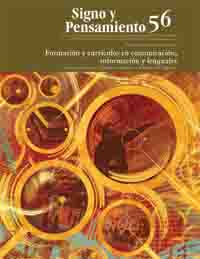Abstract
Higher education in Latin America is going through on-going times of change. Such changes seek to enhance the individual’s capacity to learn, and this is why education needs to be comprehensive while having an impact on pedagogic models. This paper attempts to conceptually analyze one of the main dimensions of comprehensive education, based on the experience in the Social Communication program offered by the School of Communication and Audiovisual Arts at Universidad Autónoma de Bucaramanga.
Coraggio, J. L. y Torres, R. M. (1998), La educación según el Banco Mundial. Un análisis de sus propuestas y métodos, Buenos Aires-Madrid, Miño y Dávila Editores.
La República (2009, 15 de mayo), “Universidad de Zaragoza: 87,77% de los estudiantes a favor de paralizar Bolonia” en línea, disponible en http://www.larepublica.es/imprimir. php3?id_article=15562, recuperado: 30 de octubre de 2009.
Proyecto Tuning (2007), “Informe final América Latina 2004-2007”, en Beneitone, P. et al. (eds.), Reflexiones y perspectivas de la educación superior en América Latina, Bilbao, Universidad de Deusto, Universidad de Groningen.
Real Academia Española (1992), Diccionario de la Lengua Española, 22.a ed., Madrid, Espasa.
Rojas, C (2001), Civilización y violencia: la búsqueda de la identidad en el siglo xix en Colombia, Bogotá, Norma.
Silverstone, R. (1996), Televisión y vida cotidiana, Buenos Aires, Amorrortu.
Universidad Autónoma de Bucaramanga (1999), “Proyecto educativo institucional” [Colección Documentos Institucionales], Bucaramanga, Universidad Autónoma de Bucaramanga (UNAB).
This journal is registered under a Creative Commons Attribution 4.0 International Public License. Thus, this work may be reproduced, distributed, and publicly shared in digital format, as long as the names of the authors and Pontificia Universidad Javeriana are acknowledged. Others are allowed to quote, adapt, transform, auto-archive, republish, and create based on this material, for any purpose (even commercial ones), provided the authorship is duly acknowledged, a link to the original work is provided, and it is specified if changes have been made. Pontificia Universidad Javeriana does not hold the rights of published works and the authors are solely responsible for the contents of their works; they keep the moral, intellectual, privacy, and publicity rights.
Approving the intervention of the work (review, copy-editing, translation, layout) and the following outreach, are granted through an use license and not through an assignment of rights. This means the journal and Pontificia Universidad Javeriana cannot be held responsible for any ethical malpractice by the authors. As a consequence of the protection granted by the use license, the journal is not required to publish recantations or modify information already published, unless the errata stems from the editorial management process. Publishing contents in this journal does not generate royalties for contributors.


